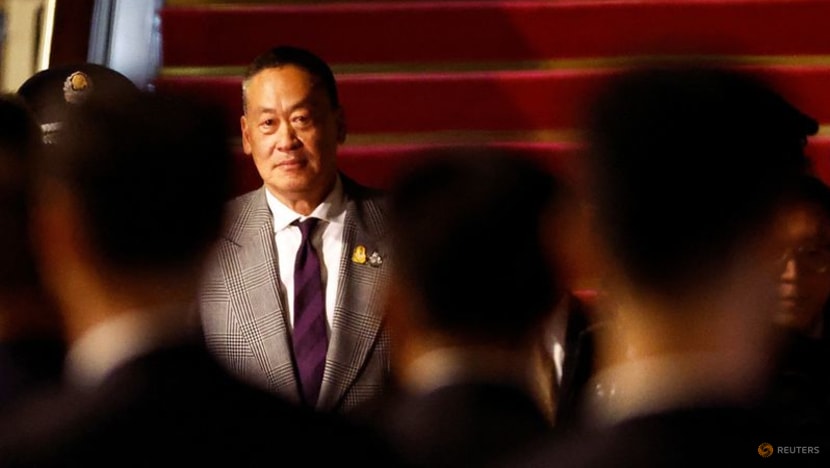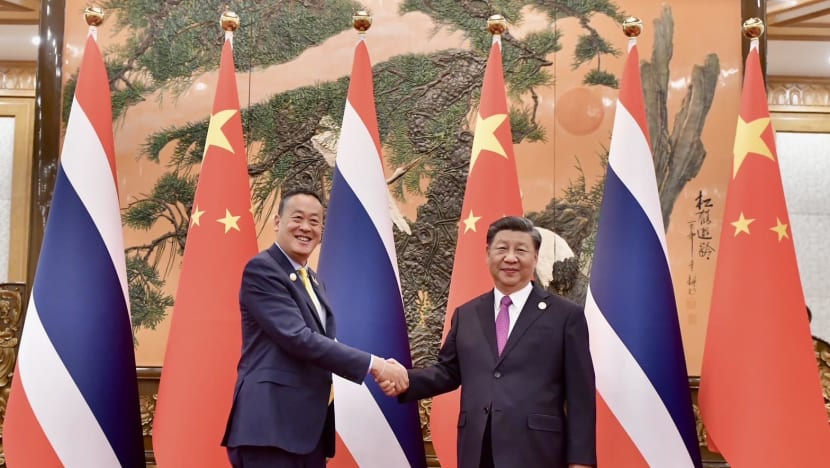Thai PM Srettha’s performance underwhelming for some in his first 100 days
Observers lauded Mr Srettha's determination and commitment, but said he needs to pay attention to political polarisation in the country.

Thailand's Prime Minister Srettha Thavisin. REUTERS/Tingshu Wang/Pool

This audio is generated by an AI tool.
BANGKOK: Thai factory worker Rattana Mapaen toils long hours to earn her daily keep of 500 baht (US$14).
As the sole breadwinner, she needs the money to care for six people in her household, including her 93-year-old bedridden mother and five children.
When businessman-turned-politician Srettha Thavisin took his oath as the prime minister in September, Ms Rattana and many lower-income Thai citizens like her were optimistic that a new leader would help better their lives.
But more than three months on, the 63-year-old is gradually losing hope.
“100 days have passed by and they should have helped us with something already. But I’ve not seen any concrete benefits yet,” she told CNA.
“Goods still remain expensive. I feel like the government's just saying empty words. We haven’t received anything. We don’t know what they are going to give us or when it will happen.”
Ms Rattana was referring to a mega cash disbursement policy, a 10,000 baht (US$280) one-time handout for each eligible Thai citizen promised by the Srettha government.
FLAGSHIP HANDOUT SCHEME
The scheme was an election pledge made by Mr Srettha’s Pheu Thai party to stimulate the nation’s economy.
The so-called “digital wallet” initiative is expected to benefit 50 million Thais and cost the administration 500 billion baht in total.
After taking office, the prime minister announced that citizens above 16 years old earning a monthly salary of below 70,000 baht and with less than 500,000 baht in savings will receive the handout.
They will have six months to spend that digital money within the district of their registered home address.
The government has been touting this policy – expected to roll out by the first half of 2024 – as one that will spur spending and boost economic activity.
Related:
However, the ambitious flagship plan has drawn scepticism from some economists who warned that it could stoke inflation and widen the fiscal deficit.
“We find that when countries do cash transfers, the multiplier effect is not very high. If you put $1 into the economy through cash transfers, it will generate only an additional $0.40 to $0.70 in the economy. So, it's not as much as governments hope for it to be,” said Dr Kirida Phaopichitr, director of economic intelligence service at the Thailand Development Research Institute.
SLUGGISH ECONOMY
Official figures showed that almost 4 million people – or 5.4 per cent of the population – are living in poverty in Thailand.
Thai households are also heavily in debt. The country’s household debt to gross domestic product (GDP) ratio is 90 per cent – one of the highest in Asia.
Families protested outside Mr Srettha’s office in early November, calling on him to address their concerns. They said the government was not paying enough attention to the marginalised.
They laid out demands including the enhancement of state welfare policies, the implementation of fairer land ownership, and help with finding jobs.
However, improvements for the Thai people could take time, with economists expecting long-term economic recovery to be challenging.
Thailand’s GDP grew at a much slower-than-expected pace in the third quarter, hampered by declining exports and government spending.
Mr Srettha said he was surprised and worried by the disappointing 1.5 per cent on-year growth in the July to September period, the lowest in the past three quarters.
He said his administration “will keep working hard” and introduce more measures, including initiatives to boost tourism.
FOREIGN DIPLOMACY
Some observers said the prime minister should be given more time beyond his first 100 days to execute his initiatives.
In the few months since taking office, Mr Srettha has already made nine overseas trips to put Thailand on the map. They include the United Nations’ General Assembly in New York, the Asia-Pacific Economic Cooperation (APEC) forum in San Francisco, the Belt and Road Forum in Beijing, and bilateral trips to neighbouring Association of Southeast Asian Nations (ASEAN) member countries Cambodia, Laos, Malaysia and Singapore.

He will be heading to Tokyo this week to attend the Japan-ASEAN summit.
He has also been dealt a tough hand, having to handle the crisis of Thai citizens caught up in the Israel-Hamas conflict. In October, 39 Thais were killed and 32 were taken hostage into Gaza by Palestinian militant group Hamas. 23 have been freed so far and nine remain in captivity.
KEY ISSUES TO ADDRESS
Analyst Siripan Nogsuan Sawasdee said that while Mr Srettha has shown determination and commitment in his premiership so far, the 61-year-old needs to work on addressing some key issues, including overcoming political polarisation in the nation.
“He has to show that he’s here not only for economic recovery but also for bridging the differences between the opposition and those who feel that they were betrayed by the Pheu Thai government,” said Assoc Prof Siripan, from Chulalongkorn University’s political science faculty.
She was referring to the political chaos that engulfed the country following general elections in May, which eventually saw Mr Srettha’s Pheu Thai party ditch former ally and election winner Move Forward Party to form the government with other parties, including those linked to military leaders.
The move was seen by many voters as a betrayal as it caused a rift between the so-called pro-democracy allies, and revealed Pheu Thai’s willingness to compromise with Thailand’s old establishment in a bid to regain political power.
“As prime minister, he needs to address that. He needs to heal the wound in Thai society from the trauma of being under the previous semi-military or semi-authoritarian regime. He has to try to balance the emphasis on the economy and political division better than this,” said Assoc Prof Siripan.
He also needs to fulfil his campaign pledges that include a hike in minimum wage, a household income guarantee, and the increasing of farm profits to lift economic growth.
Thai families facing hardship know Mr Srettha has his work cut out for him, but those like Ms Rattana want him to step up to the plate.
“There are so many who are counting on you, Mr Srettha,” she said.
“There’s a lot of hope (on you) but you cannot come out and say in the media that there’s a burden that has been put on your shoulders. Don’t even say that. You volunteered to be the prime minister. You must now take the responsibility.”

















